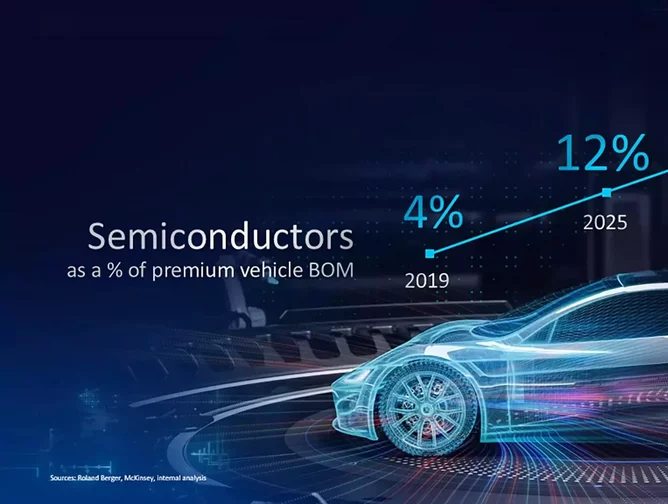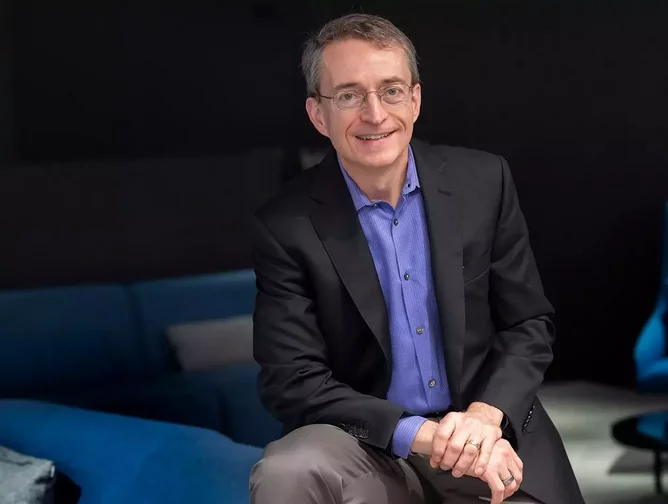Intel’s CEO Sets Plans to Build Two Semiconductor Factories

Meet Pat Gelsinger and His Predictions for the Next Decade
During his first in-person keynote since taking the role of CEO, Pat Gelsinger - who has been in the technology industry since he first joined Intel in 1979 - predicted that semiconductors will account for more than 20% of the total premium vehicle bill of materials (BOM) by 2030.

His prediction represents a 5x growth rate, compared to 2019’s 4% figure, and comes at a time where demand for semiconductors is increasing.
Other predictions made by the new CEO included the total addressable market (TAM for automotive semiconductors, which he expects to nearly double by the end of the decade to US$115bn, accounting for over 11% of the entire silicon TAM.
Gelsinger states that this trend is being driven by ‘the digitalisation of everything’, alongside four superpowers: ubiquitous computing, pervasive connectivity, cloud-to-edge infrastructure, and AI.
“This new era of sustained demand for semiconductors needs bold, big thinking. As CEO of Intel, I have the great privilege to be in a position to marshal the energies of 116,000 employees and a massive chip-design and manufacturing ecosystem, to meet the demand,” said Gelsinger.
Gelsinger started his career at Intel working for 30 years at the company between 1979 and 2005. Leaving Intel, Gelsinger joined EMC as President and COO, followed by VMware where he was CEO. Gelsinger became, and remains, Chairman of the board at Gloo, and today is the CEO of Intel, returning to the company in February 2021.

Investing in Europe
Emphasising the company’s commitment to meet the semiconductor demands, Gelsinger highlighted Intel’s plans to build at least two new leading-edge semiconductor factories in Europe, with future plans to invest up to €80bn over the next decade.
He also commented on the company’s IDM 2.0 strategy and how such programs will apply to the automotive and mobility industries in Europe.
Intel plans to partner with leading automotive players, committing significant resources to help drive the transition around the globe to higher performing processes for semiconductor production. Intel has plans to establish a committed foundry capacity at its fab in Ireland, launching the Intel Foundry Services Accelerator to help automotive chip designers transition to advanced nodes. Intel will create a new design team offering both custom and industry-standard intellectual property (IP) to support automotive customers.
Mobileye
Committed to the promising future self-driving can provide, Gelsinger welcome Mobileye’s CEO, Amnon Shashua via a video segment of the keynote.
Shashua detailed his company’s approach to driver assistance and autonomous driving opportunities, as well as Mobileye’s shared dream with Intel “the dream of autonomy – anywhere, anytime, for everybody.” Mobileye aims to lead the industry with solutions to help realise this ambition.
IEEE AV Safety Standard
Also joining Gelsinger on the stage, Jack Weast CTO at Intel and VP of Mobileye discussed the completion of the IEEE 2846 draft, which is expected to be an approved standard by the end of the year.
The IEEE 2846 will be the first AV safety standard to address the question: “How safe is safe enough?” The IEEE 2846 was initiated following the development of Mobileye’s Responsibility-Sensitive Safety (RSS) model, published in 2017.
“IEEE 2846 will give regulators the essential tool they need to welcome AVs to roads everywhere,” said Weast.
To watch the full keynote, click here.
- How Smart Factories are Reshaping the Manufacturing SectorSmart Manufacturing
- Crowe UK: 2024 Manufacturing Outlook Report Explores GrowthProduction & Operations
- Top 10: Chief Manufacturing OfficersProduction & Operations
- Aerospace Insight: Where does Boeing make all of its PlanesProduction & Operations






